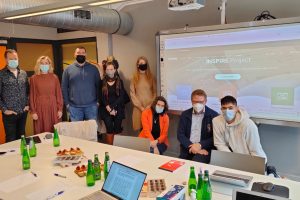
SOFT SKILLS AND NGOs | Making a concrete difference.
- Posted by IMKT Instructor
- Categories News
- Date May 6, 2021
Getting a job is the target of most people especially youth after graduation; however nowadays having a university certificate is not the only thing which matters for employers, especially with the continued increment in the graduates ‘numbers. Currently, many employers are searching for the perfect employee who will have both hard and soft skills.
What is the soft skills role though in getting a job focusing on the Non-Governmental Organizations (NGO) sector? As it is one of the most attractive destinations for youth nowadays. NGOs are characterized by international work environments; its staff consists of a different variety of people who have different certifications and skills.
How employees of the NGOs sector rankeing the soft skills depending on their daily work tasks as NGO staff. Studies results show that soft skills are very important to get involved in the NGOs sector and ranking shoes the top 10 most used soft skills in NGOs positions which can be useful to the youth who would like to work for NGOs to start developing these skills during and after their university degree. The study also showed that having a university degree is required in NGOs’ jobs however the most of the positions are not limited to one specialization.
Working in NGOs attracts a large number of people around the world especially those who want to contribute in the development of the communities in or outside their countries and create positive change all over the world. NGOs operate like any other organizations; they have staff who works in accounting, management, fundraising, logistics, public relations, business development, human relations, product development, legal and more. NGOs share a common objective in initiating and operating social development and service activities. Their operations are carried out independently for non-profit purpose. While an NGO may come in the form of a registered foundation or an unregistered assembly, it can be categorized as a part of the Non-Profit Sector, which plays a significant role in social development and service through activities of various kinds.
Individuals who undertake the role and responsibility in a non-governmental organization must suitably meet the job descriptions, from the body of knowledge to professional skills and other requirements indicated by the organization. They are also expected to possess specific characteristics, which are crucial in this line of work from voluntary spirit to personal sacrifice and ideology in social service (Chitradub & Kao-iean, 2013). There are thousands of job opportunities advertised by NGOs annually, the job description focuses mostly on the job tasks and the soft skills needed to implement it while the hard skills required for most of the NGOs’ jobs are not restricted to one specialization.
Especially jobs under the titles of: Project/program coordinator, project/program officer, project/ program assistant, project/ program associate, administrative Assistant ……etc. In such jobs, the job description includes many necessary and required soft skills such as:
- Excellent written and oral communication skills
- Capacity to work under pressure and meet tight schedules under minimum supervision.
- Leadership and Self-Management.
- Ability to organize and prioritize work schedule to meet client needs and deadlines
- Ability to approaches work with energy and a positive, constructive attitude
- Ability to remain calm, in control and good humoured even under pressure
- Ability to work productively as part of a team
- Excellent time management skills.
- Excellent English language skills, both spoken and written.
Especially when you want to apply your skills to a worthy cause and make a valuable contribution to society, there are some incentives to take on a NGO internship which taps on your professional strengths.
And since we’re talking about Professional strengths, an internship with a non-governmental organisation (NGO) can and will let you contribute towards public and social welfare while developing your skills.
Some ways to do so:
- Gain awareness of social issues
You can combine your civic goals with your career goals simply by getting out your comfort zone to be close to the ground. Employers value jobseekers who understand the world around them and are able to help organizations fulfil business gaps and social responsibilities.
For instance, an employer in the fast-moving consumer goods (FMCG) sector will be especially keen on corporate social responsibility (CSR) as part of its branding efforts, to portray itself as a conscious and reflective company. Some CSR initiatives by FMCG companies include providing free usage of health check equipments at convenience stores, and recycling initiatives for consumers to take part in.
After you have been exposed to social issues through an NGO internship, you might develop insights for how businesses can better plug social gaps through innovative products and services.
- Apply your skills to a real-world problem
Although you may not have a groundbreaking idea immediately, volunteering or working for an NGO as an intern is still a conducive setting for you to hone your skills in many areas. There are tasks available such as event planning, as well as budgeting and administration matters, not forgetting project management or grant writing and processing.
These areas of work allow you to develop transferable skills to other social programmes or in a commercial setting for your future career.
There are alaways venues for volunteering your skills and improving them at the same time. For instance, you can sign up to be a docent at a museum and be exposed to curation and outreach efforts.
- Build your circle of like-minded professionals
Interning at an NGO is different from doing so in a corporate setting. You are more likely to meet other individuals and groups who are as passionate about a variety of issues, and these are precious social networks for a young student or graduate at the start of your career path.
To learn more about society, put your skills to a good cause, and meet people with similar passions – these are just some incentives on why you can consider an NGO internship to give and receive at the same time and enrich your soft skills same time!
You may also like

An Inspired journey

Final Transnational Meeting
Vocational Education and Social Organizations
Social organizations have specific ambitions in the social domain. They focus for example on human wellbeing, empowering people, supporting sustainable practices, or developing products or services that make a difference to how we live and work. Social organizations challenge our …
